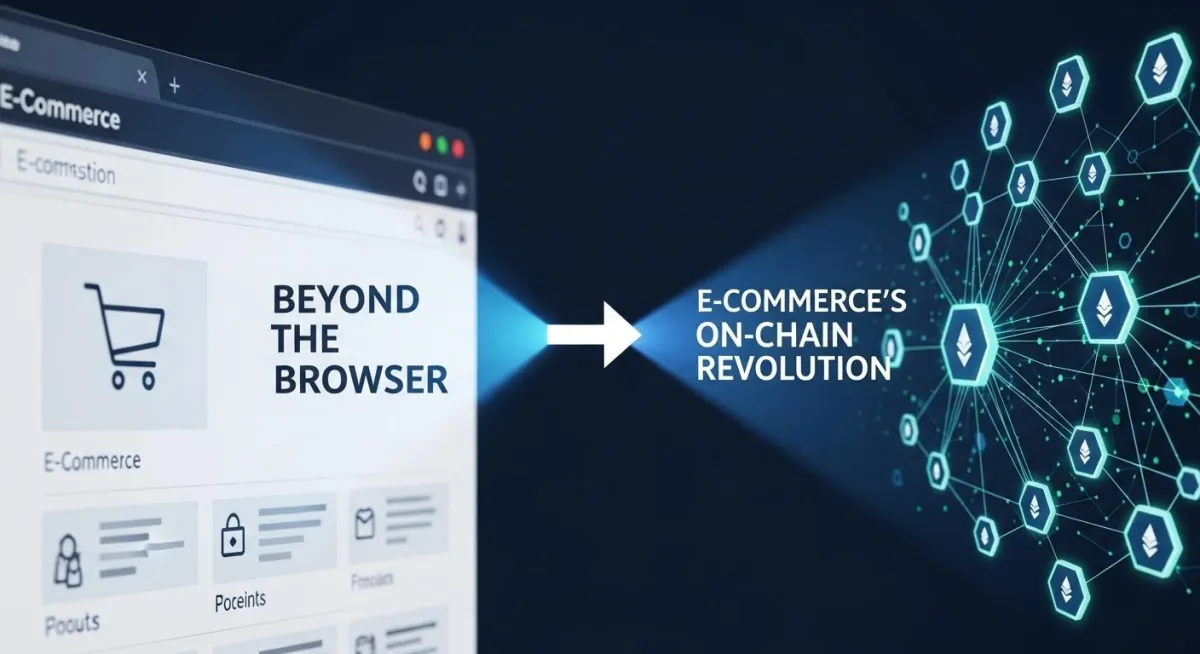
E-Commerce’s On-Chain Revolution: Beyond the Browser
Introduction
The next evolution of e-commerce isn’t just coming, it’s already happening.
Blockchain is reshaping how we shop, own, and connect online, introducing transparency, security, and true digital ownership at a scale the world has never seen. The future of shopping isn’t centralized. It’s on-chain.
The Cracks in Traditional E-Commerce
For years, e-commerce has been the gold standard for convenience. With a few clicks, you could buy anything from anywhere. But that convenience came with a hidden cost.
Every purchase, every login, every scroll leaves behind data, your data, often monetized by corporations you’ve never even heard of. In 2023 alone, IBM Security reported that the average global cost of a single data breach hit $4.45 million, and that number keeps climbing.
Then there’s the issue of intermediaries. Payment processors, ad platforms, and marketplaces all take their cut before the actual creator or merchant gets paid. Consumers end up paying more. Merchants earn less. Trust is scattered across multiple platforms, and loyalty feels transactional rather than meaningful.
The result? A system built on silos, fees, and uncertainty.
The Blockchain Breakthrough
Blockchain flips that system on its head.
Instead of central authorities, it uses a shared, tamper-proof ledger that everyone can trust. Transactions are transparent, secure, and verifiable, without needing a middleman to say, “I promise this is real.”
Imagine a world where smart contracts automatically process refunds, verify authenticity, or even trigger loyalty rewards, all without human interference or corporate bias. That’s the magic of going on-chain: trust built into the system itself.
Platforms likeUni-Fy are leading this charge, transforming e-commerce into a transparent ecosystem where ownership, PLauthenticity, and engagement exist in one seamless flow.
Ownership Redefined Through NFTs
NFTs aren’t just about art anymore. They represent a new model for digital ownership.
Imagine buying sneakers online, and instantly receiving a digital twin of that product as an NFT. That NFT acts as proof of authenticity, access to exclusive communities, or even a resale pass if the product appreciates in value.
TechCrunch recently noted how brands are using NFTs to create exclusive digital experiences and reward loyal customers. This isn’t hype, it’s utility. Each purchase becomes more than a transaction; it becomes a verifiable piece of your digital identity.
WithUni-Fy, this model becomes real for everyone, brands, creators, and communities alike.
Rethinking Loyalty and Rewards
Let’s be honest, most loyalty programs today feel… hollow. Points expire. Rewards feel generic. Transparency is non-existent.
On-chain loyalty changes that. Every reward is tokenized, traceable, and truly owned by the user. These tokens can be exchanged, transferred, or redeemed across multiple partner brands, creating a unified ecosystem of value.
A 2023 McKinsey report revealed that customers now demand personalized engagement and authentic connection. Tokenized loyalty delivers exactly that, direct, visible, and real.
This is whatUni-Fy aims to build: a system where loyalty isn’t confined to one brand, but powered by a transparent, borderless community of trust.
Security, Transparency, and Fair Play
Fraud has been e-commerce’s constant shadow, costing businesses billions every year. Blockchain’s encrypted, immutable record makes fraud nearly impossible. Every step, from product creation to final delivery, can be verified on-chain.
This also revolutionizes supply chain visibility. Consumers can trace the full journey of what they buy, how it was made, where it was sourced, and whether it aligns with ethical standards. Transparency stops being a buzzword and becomes a built-in feature.
For brands onUni-Fy, this means trust is no longer earned with slogans, it’s proven with data.
Decentralized Commerce: Cutting Out the Middlemen
Why rely on centralized platforms when creators and buyers can connect directly?
Decentralized marketplaces built on blockchain allow peer-to-peer commerce, drastically reducing fees and giving creators true control over their earnings.
It’s not just about cheaper transactions, it’s about freedom.
Freedom from arbitrary bans.
Freedom from platform fees.
Freedom to own your audience, your data, and your future.
That’s the promise of on-chain commerce, and it’s the reality Uni-Fy is helping to shape.
The Road Ahead
Yes, there are still challenges, scalability, regulation, and accessibility. But these are growing pains, not deal-breakers. The biggest companies in the world, from Shopify to Visa, are already integrating blockchain because the direction is clear.
The internet we know today was once slow, clunky, and complicated too, until it became second nature. That’s where blockchain is headed, and platforms like Uni-Fy are making that transition effortless for everyday brands and users.
Conclusion: Beyond the Browser
The future of e-commerce isn’t just about faster delivery or bigger sales.
It’s about ownership, trust, and empowerment.
It’s about moving from dependence to transparency.
From transactions to relationships.
From browsing… to belonging.
The shift has already begun. The question is: will you adapt, or watch from the sidelines?
👉 Step into the on-chain era withUni-Fy, where commerce becomes community, and ownership becomes power.
